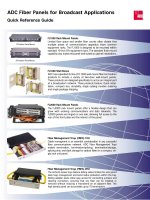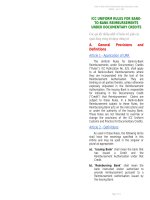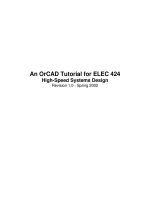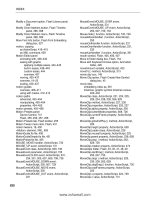Tài liệu SIMPLE IRA PLANS for Small Businesses pptx
Bạn đang xem bản rút gọn của tài liệu. Xem và tải ngay bản đầy đủ của tài liệu tại đây (82.03 KB, 11 trang )
SIMPLE IRA PLANS
for Small
Businesses
finalSimpleIRACover.qxd 11/5/04 1:24 AM Page 1
Simple IRA Plans for Small Businesses is a joint project of the U.S. Department of Labor's
Employee Benefits Security Administration (EBSA) and the Internal Revenue Service.
This publication and other EBSA materials are available by calling toll-free:
1-866-444-EBSA (3272)
Or visit the agency's Web site at: www.dol.gov/ebsa
Simple IRA Plans for Small Businesses is also available from the Internal
Revenue Service at:
1-800-TAX-FORM (1-800-829-3676)
(Please indicate catalog number when ordering)
This material is available to sensory impaired individuals upon request:
Voice phone: (202) 693-8664
TDD: (202) 501-3911
This publication constitutes a small entity compliance guide for purposes of the Small Business Regulatory Enforcement Fairness Act of 1996.
finalSimpleIRACover.qxd 11/5/04 1:24 AM Page 2
-1-
Thinking about a retirement plan?
If it seems like the right thing for
your business now, here’s a SIMPLE
one.
A SIMPLE (Savings Incentive Match Plan for
Employees of Small Employers) IRA plan offers
great advantages for businesses that meet two basic
criteria. First, your business must have 100 or
fewer employees (who earned $5,000 or more
during the preceding calendar year). In addition,
you cannot currently have another retirement plan.
If you are among the thousands of business owners
eligible for a SIMPLE IRA plan, read on to learn
more.
A SIMPLE IRA provides employers and their
employees with a simplified way to contribute
toward retirement. It reduces taxes and, at the
same time, attracts and retains quality employees.
And compared to other types of retirement plans,
SIMPLE IRA plans offer lower start-up and annual
costs … they are just simpler to operate.
Other Advantages of a SIMPLE IRA Plan:
❑ SIMPLE IRA plans are easy to set up and run –
your financial institution handles most of the
details.
❑ Employees can contribute, on a tax-deferred
basis, through convenient payroll deductions.
❑ You can choose either to match the employee
contributions of those who decide to
participate or to contribute a fixed percentage
of all eligible employees’ pay.
❑ You may be eligible for a tax credit of up to
$500 per year for each of the first 3 years for
the cost of starting a SIMPLE IRA plan. (IRS
Form 8881, Credit for Small Employer
Pension Plan Startup Costs).
❑ Administrative costs are low.
❑ You are not required to file annual financial
reports.
ESTABLISHING THE PLAN
Starting a SIMPLE IRA plan is easy to do!
Step 1: Contact a retirement plan professional or
a representative of a financial institution that offers
retirement plans. Many financial institutions will
probably have a pre-approved SIMPLE IRA plan
form that you can review.
Step 2: Choosing a financial institution to
maintain employees' SIMPLE IRAs is one of the
most important decisions you will make, since that
entity becomes a trustee to the plan. (Alternatively,
you can decide to let employees choose the
financial institution that will receive their
contributions.)
Regardless of who makes the choice, only the
following institutions can be designated as trustees
of SIMPLE IRA plans: banks, mutual funds,
insurance companies that issue annuity contracts,
and certain other financial institutions that have
been approved by the IRS. Trustees agree to:
❑ Receive and invest contributions, and
❑ Provide the employer with a summary
description of the plan features each year.
Step 3: Choose a model form or other plan
document offered by your financial institution. If
your financial institution offers a model SIMPLE
IRA plan document, you will have a choice of two
forms to use:
❑ IRS Form 5304-SIMPLE, Savings Incentive
Match Plan for Employees of Small Employers
(SIMPLE) - Not for Use With a Designated
Financial Institution, or
❑ IRS Form 5305-SIMPLE, Savings Incentive
Match Plan for Employees of Small Employers
(SIMPLE) for Use With a Designated Financial
Institution.
The model form you use will depend on whether
you decide to select the financial institution that
will receive contributions or to let your employees
select financial institutions.
❑ If employees are allowed to select the financial
institutions that will receive their SIMPLE IRA
-2-
plan contributions, you will fill out Form
5304-SIMPLE.
❑ If you require that all contributions under the
SIMPLE IRA plan be initially deposited with a
designated financial institution, you will fill out
Form 5305-SIMPLE.
Your choice of the employees covered will be set
out in your selected plan document. You can
choose to cover all employees without restriction.
Alternatively, you can limit the employees covered
to those who received at least $5,000 in
compensation during any 2 years prior to the
current calendar year and who are reasonably
expected to receive at least $5,000 during the
current calendar year.
Step 4: Complete and sign the selected IRS form
(or other plan document, if not using a model
form). When it is completed and signed, this
document becomes the plan’s basic legal document,
describing your employees’ rights and benefits. Do
not send it to the IRS; instead keep it handy.
OPERATING THE PLAN
A SIMPLE IRA plan is true to its name when it
comes to plan operation. Contributions under the
plan (employees’ and yours) are simply deposited
into individual retirement accounts or annuities.
Participants in a SIMPLE IRA Plan
Employees who elect to make contributions or to
whose accounts you deposit contributions are
participants. Your obligation is to provide
information to your financial institution on those
employees who can participate as described in your
plan document. You will want to keep your
financial institution aware of any changes in the
status of those employees who can participate (for
example, new employees).
Enrolling Employees in a SIMPLE
IRA Plan
SIMPLE IRA plans operate on a calendar-year
basis. An employer may initially set up a SIMPLE
IRA plan as late as October 1.
A SIMPLE IRA must be set up for each employee
eligible to participate. Employees must receive
notice of their right to participate, to make salary
reduction contributions, and to receive employer
contributions. In addition, employees must receive
information about the plan, including a copy of the
summary description. The required notice also
informs employees of the plan’s election periods
during which eligible employees can decide to
contribute to the plan. For employers that use one
of the model forms, page 3 of Form 5304-SIMPLE
and page 3 of Form 5305-SIMPLE contain a
model notice.
Employee Contributions
Employees can make salary reduction contributions
in any amount to a SIMPLE IRA plan up to the
legal limits. The maximum amount that an
employee can contribute is $9,000 in 2004,
increasing to $10,000 in 2005. (This amount may
be subject to adjustments for years after 2005.)
Additional employee contributions (known as
catch-up contributions) are allowed for employees
age 50 or over. The additional contribution limit is
$1,500 in 2004, $2,000 in 2005, and $2,500 in
2006. (This amount may be subject to adjustments
for years after 2006.)
Each year employees can change their contribution
levels during the plan’s election period. This
election period must be at least 60 days long, and
employees must receive prior notice about an
upcoming election opportunity. SIMPLE IRA
plans that have already been established must have
an annual election period that extends from
November 2 to December 31. A plan can have
more election periods each year in addition to this
60-day election period.
-3-
Employer Contributions
You have two choices in determining your
contributions to the SIMPLE IRA plan:
❑ A 2 percent nonelective employer contribution,
where employees eligible to participate receive
an employer contribution equal to 2 percent of
their compensation, regardless of whether they
make their own contributions.
❑ A dollar-for-dollar match up to 3 percent of
pay, where only the participating employees
who have elected to make contributions will
receive an employer contribution, i.e., the
matching contribution.
Each year, you can choose which one you will use
for the next year’s contributions. This choice is
part of the information you are required to
communicate to employees before the beginning of
the 60-day election period.
Depositing and Investing Plan
Contributions
Employee contributions must be deposited in the
financial institution serving as trustee for the plan
within 30 days after the end of the month in which
the amounts would otherwise have been payable to
the employee in cash. Your employer contributions
must be made by the due date (including
extensions) for filing your business’s Federal income
tax return for the year.
After forwarding the SIMPLE IRA plan
contributions to the trustee, the trustee will invest
the funds, in many cases at the direction of the
How Does a SIMPLE IRA Plan Work?
Example 1:
Elizabeth works for the Rockland Quarry Company, a small business with 50 employees. Rockland has decided
to establish a SIMPLE IRA plan for all its employees and will match its employees’ contributions dollar-for-
dollar up to 3 percent of each employee’s salary. Under this option, if a Rockland employee does not contribute
to his or her SIMPLE IRA, then that employee does not receive any matching employer contributions from
Rockland.
Elizabeth has a yearly salary of $50,000 and decides to contribute 5 percent of her salary to her SIMPLE IRA.
Elizabeth’s yearly contribution is $2,500 (5 percent of $50,000). The Rockland matching contribution is $1,500
(3 percent of $50,000). Therefore, the total contribution to Elizabeth’s SIMPLE IRA that year is $4,000 (her
$2,500 contribution plus the $1,500 contribution from Rockland). The financial institution partnering with
Rockland on the SIMPLE IRA has several investment choices and Elizabeth is free to pick and choose which
ones suit her best.
Example 2:
Austin works for the Skidmore Tire Company, a small business with 75 employees. Skidmore has decided to
establish a SIMPLE IRA plan for all its employees and will make a 2 percent nonelective contribution for each
of its employees. Under this option, even if an eligible Skidmore employee does not contribute to his or her
SIMPLE IRA, that employee would still receive an employer nonelective contribution to his or her SIMPLE
IRA equal to 2 percent of salary.
Austin has a yearly salary of $40,000 and has decided that this year he simply cannot make a contribution to his
SIMPLE IRA. Even though Austin does not make a contribution this year, Skidmore must make a nonelective
contribution of $800 (2 percent of $40,000). The financial institution partnering with Skidmore on the
SIMPLE IRA has several investment choices, and Austin has the same investment options as the other plan
participants.
participants. SIMPLE IRAs can be invested in
stocks, bonds, mutual funds, and similar types of
investments. Employee and employer
contributions are always 100 percent vested—that
is, the money an employee has put aside plus
employer contributions and earnings from
investments cannot be forfeited. Employees can
move their SIMPLE IRA assets from one SIMPLE
IRA plan to another in accordance with the
procedures of the financial institution.
Communicating With Employees
There are two key disclosure documents that keep
participants informed about the basics of how the
plan operates, inform them of changes in the plan’s
structure and operation, and provide them a chance
to make decisions and take timely action with
respect to their accounts.
The summary description is a plain-language
explanation of the plan and is comprehensive
enough to inform participants of their rights and
responsibilities under the plan. It also informs
participants about the features of the plan. This
document is usually provided by the financial
institution and is given to participants at the plan’s
inception, when employees first join the plan, and
annually thereafter.
A summary description must include:
1. The names and addresses of the employer and
trustee,
2. A description of the requirements for eligibility
to participate,
3. The benefits provided,
4. The time and method of making salary
elections, and
5. The procedure for, and effects of, withdrawals
and rollovers (including the penalties for early
withdrawals).
Employers can satisfy the summary description
requirement by providing employees with the most
recent copy of IRS Form 5304-SIMPLE or 5305-
SIMPLE provided by the Financial Institution (if
one of these model forms is used to establish the
SIMPLE IRA plan), along with the financial
institution's procedures for withdrawals and
transfers.
Each year, in addition to the information above,
employees must receive an annual election notice
describing their right to make salary reduction
contributions and the employer’s decision to make
either matching or nonelective contributions for
the following year. For employers that use one of
the model forms, page 3 of Form 5304-SIMPLE
and page 3 of Form 5305-SIMPLE contain a
Model Notification to Eligible Employees that can be
used to provide this information to employees.
Every year, during the 60-day election period at the
end of the year, employees must be given the
opportunity to enter into a salary reduction
agreement or to modify an existing agreement.
Reporting to the Government
SIMPLE IRA plans are NOT required to file
annual financial reports with the government.
Distributions from the plan are reported by the
financial institution making the distribution to
both the IRS and the recipients of the distributions
on Form 1099-R, Distributions from Pensions,
Annuities, Retirement or Profit-Sharing Plans, IRA,
Insurance Contracts.
The financial institution/trustee handling the
SIMPLE IRAs provides the IRS and participants
with an annual statement containing contribution
and fair market value information on Form 5498,
Individual Retirement Arrangement Contribution
Information.
SIMPLE IRA contributions are not included in the
“Wages, tips, other compensation” box of Form
W-2, Wage and Tax Statement. However, salary
reduction contributions must be included in the
boxes for Social Security and Medicare wages.
-4-
-5-
When Employees Want to Stop
Contributions
Employees may elect to terminate their salary
reduction contributions to a SIMPLE IRA plan at
any time. If they do so, the SIMPLE IRA plan may
preclude them from resuming salary reduction
contributions until the beginning of the next
calendar year. Employers that are making
nonelective employer contributions must continue
to make them on behalf of these employees.
Distributions
Participants cannot take loans from their SIMPLE
IRAs.
SIMPLE IRA contributions and earnings can be
withdrawn at any time. When participants take a
distribution, they typically can elect to:
❑ Take a lump sum distribution of their account,
or
❑ Roll over their account to an IRA or another
employer’s retirement plan.
Distributions from a SIMPLE IRA are generally
subject to income tax for the year in which they are
received. If a participant takes a withdrawal from a
SIMPLE IRA before age 59 1/2, generally a 10
percent additional tax applies. If such withdrawal
occurs within 2 years of beginning participation,
the 10 percent tax is increased to 25 percent.
SIMPLE IRA contributions and earnings may be
rolled over tax-free from one SIMPLE IRA to
another. A tax-free rollover may also be made from
a SIMPLE IRA to another type of IRA, or to
another employer’s qualified plan, after 2 years of
beginning participation in the original plan.
A specific minimum amount of SIMPLE IRA
contributions and earnings is required to be
distributed by April 1 of the year following the year
the participant reaches age 70 1/2. After this initial
year, the participant must receive a required
minimum distribution for each year by December
31 of that year. (For further details regarding the
required minimum distribution amount, see IRS
Publication 590.)
Monitoring the Trustee
As the plan sponsor, you should monitor the
trustee to assure that it is doing everything that it is
required to do. You should also ensure that the
trustee’s fees are no more than reasonable for the
services it is providing. If the trustee is not doing
its job properly, or if its fees are not reasonable, you
should consider replacing the trustee.
TERMINATING THE PLAN
Although SIMPLE IRA plans are established with
the intention of being on-going, the time may
come when a SIMPLE IRA plan no longer suits the
purposes of your business. When that happens,
consult with your financial institution to determine
if another type of retirement plan might be a better
alternative.
To terminate a SIMPLE IRA plan, notify the
financial institution that you will not make a
contribution for the next calendar year and that
you want to terminate the contract or agreement.
You must also notify your employees that the
SIMPLE IRA plan will be discontinued.
You do not need to give any notice to the IRS that
the SIMPLE IRA plan has been terminated.
MISTAKES … AND HOW TO
CORRECT THEM
Even with the best intentions, mistakes in plan
operation can still happen. The U.S. Department
of Labor and the IRS have correction programs to
help SIMPLE IRA plan sponsors correct plan
errors, protect participants, and keep the plan’s tax
benefits. These programs are structured to
encourage you to correct the errors early.
-6-
Periodically reviewing the plan makes it easier to
spot and correct mistakes in plan operation.
See the Resources section for further information.
YOUR SIMPLE IRA PLAN — A
QUICK REVIEW
❑ Choose a financial institution to set up your
SIMPLE IRA plan.
❑ Enroll your employees and start salary
reduction contributions.
❑ Deposit contributions timely.
❑ Tell your employees about their rights under
the plan.
❑ Monitor your trustee.
RESOURCES
The U S. Department of Labor’s (DOL’s)
Employee Benefits Security Administration and the
IRS feature this booklet and additional information
on retirement plans on their Web sites:
www
.dol.gov/ebsa - Click on “Compliance
Assistance for Small Employers” and on
“Publications/Reports” for information you and
your employees can use.
www
.irs.gov/ep - Click on “Retirement Source for
Plan Sponsors/Employers.” All the forms and
publications mentioned in this booklet are available
on this Web site.
The following jointly developed publications are
available on the IRS and DOL Web sites and
through the toll-free numbers listed below:
❑ Choosing a Retirement Solution for Your Small
Business, Publication 3998, provides an
overview of retirement plans available to small
businesses.
❑ Retirement Plan Correction Programs,
Publication 4224, provides a brief description
of the IRS, DOL, and Pension Benefit
Guaranty Corporation (PBGC) correction
programs.
❑ Retirement Plan Correction Programs CD-
ROM, Publication 4050, provides in-depth
information on the IRS, DOL, and PBGC
correction programs.
Order from:
IRS: 1-800-TAX-FORM (1-800-829-3676)
DOL: 1-866-444-EBSA (3272)
Related materials available from DOL:
DOL sponsors two interactive Web sites - the Small
Business Advisor, available on the DOL Web site,
and, along with the U.S. Chamber of Commerce
and the Small Business Administration,
www.selectaretirementplan.org.
Related materials available from the IRS:
❑ Publication 560, Retirement Plans for Small
Business (SEP, SIMPLE, and Qualified Plans)
❑ Publication 590, Individual Retirement
Arrangements (IRAs)
-7-
—NOTES—
-8-
—NOTES—
U.S. Department of Labor
finalSimpleIRACover.qxd 11/5/04 1:24 AM Page 3









